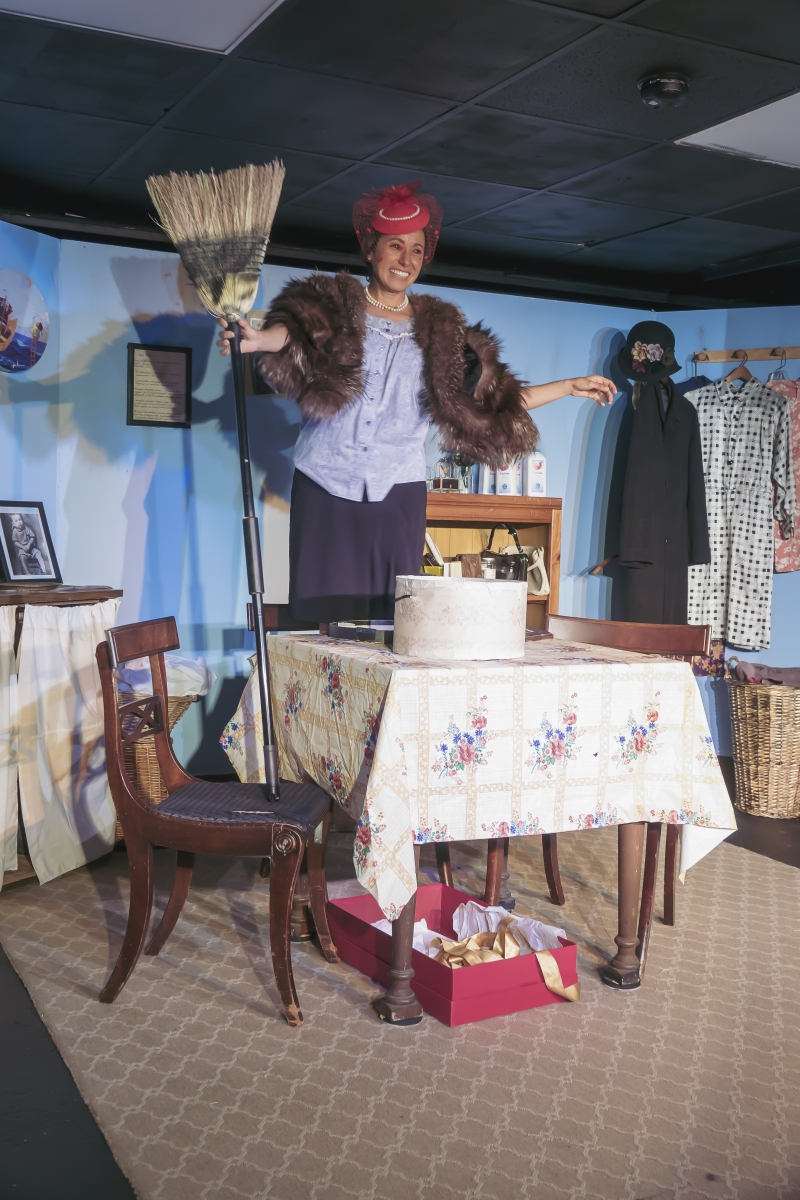Review: MI ESCOBA POR UN REINO/ GOD SAVE THE QUEEN at Teatro De La Luna
The production runs through June 9th

Situated in Petworth next to a dental office is the harvest orange brick building housing Teatro de la Luna. While small, the atmosphere is cozy: soothing incense burns, croissant sandwiches are sold at concessions, and someone may spark a conversation with you while waiting for the house to open. Things at Teatro de la Luna feel familiar, and from May 31 - June 9th, they are showing their one-woman show, Mi Escoba por un Reino, or God Save the Queen, starring Patricia Meneses, written by Kado Kostzer, with direction by Mario Marcel.
The show follows Isabel, a seamstress, through different phases of her life. At the top of the show, the time is 1948, and Isabel is expecting a baby. The father, Mario, is overseas, a sailor, stationed far away, oblivious to Isabel's pregnancy. We first get to know Isabel through her apartment, which happens to be the set of the piece (Mario Marcel and Nucky Walder) of the entire show. It's decorated sparsely, save for newspaper and magazine clippings of the young Queen Elizabeth II, whom we learn Isabel named herself after, and idolizes in all facets of life. So much so in fact, that she decided to cancel her abortion because she found out the Queen is pregnant, and her baby is due around the same time.
This is the first of many times themes around escapism/ hope are explored. Isabel seeks solace outside of her arduous life by way of astrology, mysticism, and of course, the royal family. Throughout her life, and after the birth of her son, Isabel compares herself, her son, and her circumstances to those of their royal counterparts. Perhaps by being like the Queen and her family in this one, small way, Isabel will be able to escape her circumstances and experience the privilege of the imperial woman she so idolizes. Unfortunately, though, that is not the case. Despite her optimism, things do not go well for Isabel, and we see this snowball of misfortunate build over the three decades the show spans.
Isabel's growing age is expressed through changes in hair (Juanita Real), make-up (Patricia Meneses), and costumes (Nucky Walder), but above all, Meneses' performance. At the top of the show, Isabel, is quirky, frenetic, and beaming. She feasts on crackers, talks to a parenting book, gags on milk. As she evolves, her charm and charisma become labored by the stress of raising a child alone, a tumultuous one at that. As her baby boy ages, it becomes apparent he is not like his Prince counterpart, and is perhaps disturbed, or stressed, and capable of things no mother wants their child to be capable of. She is no longer optimistic, but optimistic, despite everything.
As she ages even more, Meneses molds her posture and mannerisms to suit someone weighed down by labor and parenthood. In happier moments, one can catch fleeting moments of Isabel's old self. One that dances with a coat rack, or talks to herself in the mirror. But still, she is forever changed. The years feel intrinsic in her physicality, her speech pattern slightly delayed, her breath ever so labored. Due to the small space, Meneses is really under a microscope, and it's in these small details where her performance really shines.

And, though this is a one-woman show, Isabel is never truly alone. Near the beginning of the show, the proverbial ghost of her lover haunts her, and then, her son, who always lingers just out of view. A recurring character, who also acts as a proxy for the audience, is Esther, Isabel's neighbor across the way. She talks to her through a cleverly designed "window."
Isabel speaking directly to these characters who don't speak back, is, at first a little jarring. It leaves one to ask, initially, what is the value of "dialogue" in a one-person show? However, it does compound this intense, isolating loneliness. Yes, there are other people in Isabel's life, but they are unseen, unknowable. They feel miles away. Perhaps in some ways, she is truly alone, mending trousers in her apartment.
The show illuminates the universal struggles of being a single mother, escapism, and perhaps the propensity of the world to push false narratives about people (usually white people) in positions of power. The main function of the piece is drama. It is entertaining and presents some stimulating concepts, however, it is never too exploratory of these concepts, or even of the circumstances and events of the main character's life. It never quite gets to the point of asking a question, but more so presents a detailed slice (or slices) of life. It's a complex and intricate portrait of an everywoman.
At the base of the show is Meneses, whose lively Isabel takes the audience stumbling through life with her. We see her grapple with herself, her son, and most of all her expectations: for her life and her son. God Save the Queen, is tragic, funny, and deeply internal.
The show is performed entirely in Spanish, however, there is an English translation by David Bradley used for above-stage supertitles (Marcela Ferlito), accessible to about half the audience. The show runs for 90 minutes with a ten minute intermission. Information on tickets and other endeavors by the company can be found on their website at teatrodelaluna.org.
Comments
Videos
